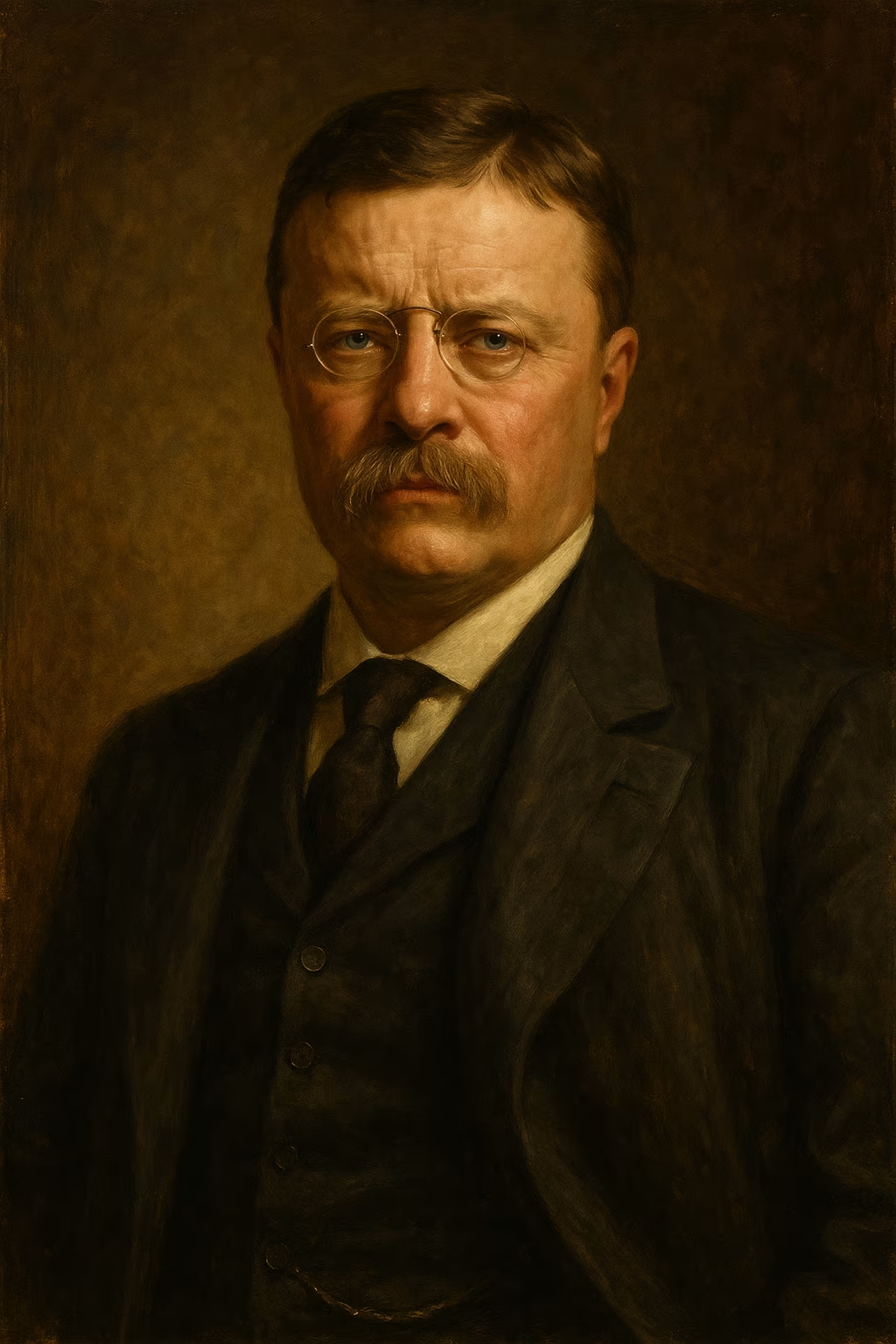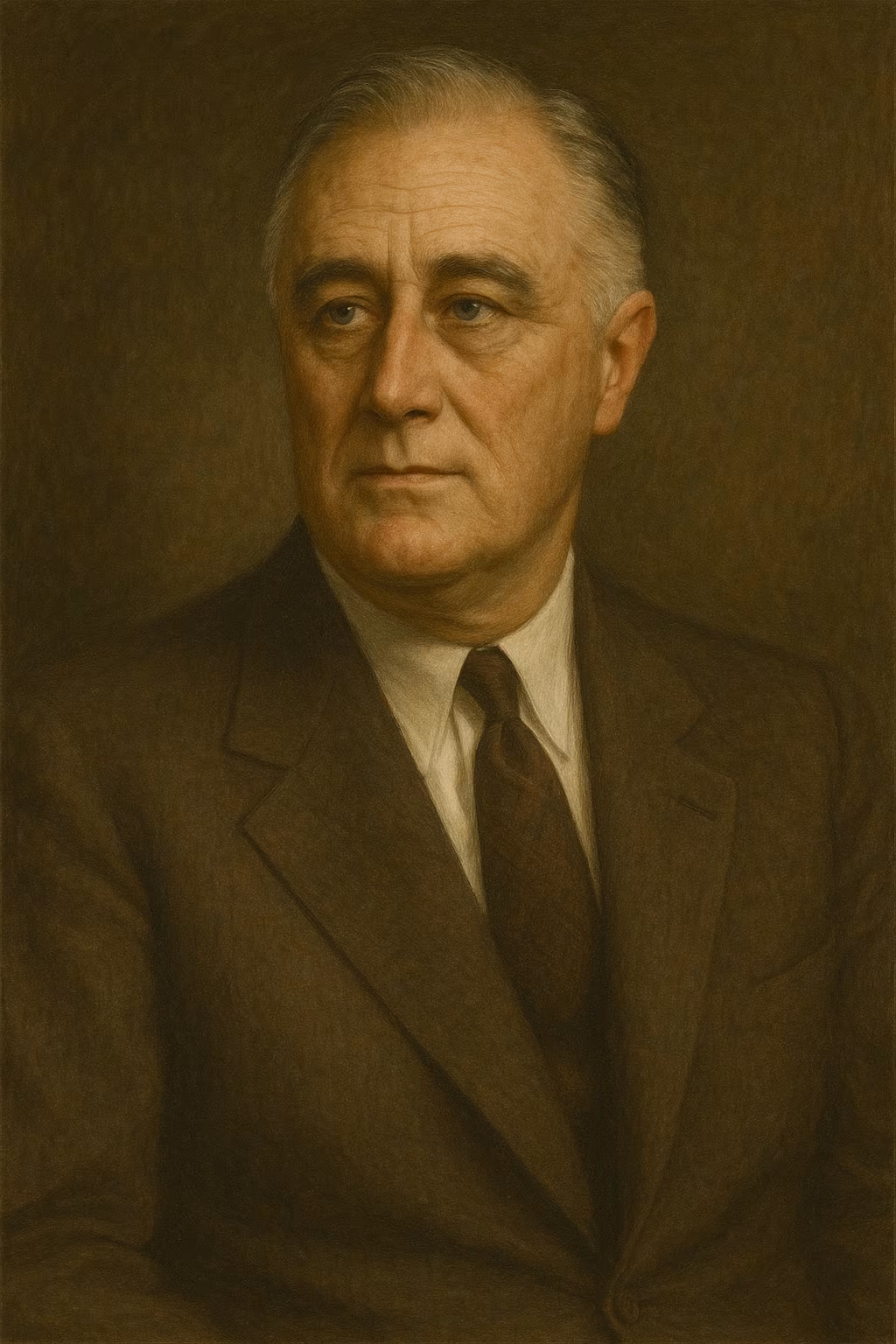Theodore Roosevelt (1858 – 1919)
Quick Summary
Theodore Roosevelt (1858 – 1919) was a president of the united states and major figure in history. Born in New York City, New York, United States, Theodore Roosevelt left a lasting impact through Advanced the Square Deal and key antitrust legislation.

Birth
October 27, 1858 New York City, New York, United States
Death
January 6, 1919 Oyster Bay, New York, United States
Nationality
American
Occupations
Complete Biography
Origins And Childhood
Born on October 27, 1858, into a prosperous Manhattan household, Theodore Roosevelt grew up at 28 East 20th Street amid a rapidly modernizing city. His father, philanthropist Theodore Roosevelt Sr., stressed civic duty, while his mother, Martha Bulloch Roosevelt, brought Southern traditions from her Georgia upbringing. Afflicted with chronic asthma and frailty, young Roosevelt endured terrifying nighttime attacks; physicians recommended quiet travel, yet he embraced a regimen of vigorous exercise that forged his celebrated "strenuous life." A voracious reader, he compiled natural history specimens and drafted a homemade treatise titled "The Roosevelt Museum of Natural History." Tutors prepared him for Harvard, where he studied history, boxed, and met Alice Hathaway Lee, whom he married in 1880. Dual losses—the death of his mother and wife on February 14, 1884—prompted his retreat to the Dakota Territory, where ranching, blizzards, and frontier camaraderie hardened his resilience.
Historical Context
Roosevelt's rise unfolded during America's Gilded Age, defined by rapid industrialization, vast corporate trusts, labor unrest, and mass immigration. Political machines wielded patronage while reformers demanded civil-service merit and social legislation. The Progressive movement sought to tame corporate power, expand government oversight, and protect workers and consumers. Overseas, expansionists eyed Cuba, the Pacific, and Asia. Roosevelt, influenced by social gospel reformers, historians like Francis Parkman, and his western experience, concluded that only a strong federal government could mediate industrial capitalism and safeguard republican institutions.
Public Ministry
Elected to the New York State Assembly in 1882, Roosevelt crusaded against corruption. Appointed to the U.S. Civil Service Commission by President Benjamin Harrison and retained by Grover Cleveland, he rigorously enforced merit-based hiring. As president of New York City's Board of Police Commissioners (1895–1897), he modernized the force, personally patrolling night beats. In 1897 he became assistant secretary of the Navy, pushing for preparedness and dispatching Commodore Dewey to Manila at the outbreak of the Spanish-American War. He resigned to form the Rough Riders, whose charge up San Juan Hill made him a national hero. Elected governor of New York in 1898, he enacted tax, labor, and utility reforms. Republican bosses elevated him to the vice-presidency in 1900; McKinley's assassination in 1901 made Roosevelt, at forty-two, the youngest president to that time.
Teachings And Message
Roosevelt's political creed centered on the Square Deal—fairness for capital, labor, and consumers. He condemned "malefactors of great wealth," pursued antitrust prosecutions, and advocated federal oversight to curb abuses. He promoted Pure Food and Drug legislation, intervened in labor disputes like the 1902 coal strike, and believed conservation of forests and rivers was a moral obligation. Internationally, he blended naval strength with arbitration, dispatching the Great White Fleet while mediating conflicts. His books, including "The Strenuous Life" and "The New Nationalism," fused moral exhortation with pragmatic governance, urging citizens toward active citizenship.
Activity In Galilee
During his presidency Roosevelt filed over forty antitrust suits, created the Department of Commerce and Labor, and engineered the Panama Canal project after supporting Panamanian independence. He invited Booker T. Washington to dine at the White House, yet also reflected contemporary racial prejudices, backing segregated army units and supporting the Brownsville dismissal. He championed conservation, naming national parks, monuments, bird refuges, and forests, often touring the country to promote stewardship.
Journey To Jerusalem
Roosevelt's consolidation of executive authority drew opposition from conservative Republicans and corporate titans. After leaving office he broke with President William Howard Taft, formed the Progressive "Bull Moose" Party in 1912, survived an assassination attempt in Milwaukee, and split the Republican vote, enabling Woodrow Wilson's victory. Abroad, his Roosevelt Corollary justified interventions in the Caribbean, stirring debate over imperial reach.
Sources And Attestations
Extensive primary sources document Roosevelt: newspapers, correspondence, presidential papers, photographs, early newsreels, and his own prolific writings. Archival records from the Civil Service Commission, the Navy Department, and the National Park Service chronicle his reforms, while memoirs by allies like Elihu Root and Gifford Pinchot offer insider perspectives.
Historical Interpretations
Historians portray Roosevelt as both visionary reformer and muscular imperialist. Edmund Morris emphasized his civic heroism; Kathleen Dalton explored his contradictions as an aristocratic democrat; Howard K. Beale critiqued his ties to business. Contemporary scholarship investigates his masculinity, media savvy, and the administrative state he helped build.
Legacy
Roosevelt's legacy spans politics, conservation, and culture. He expanded presidential leadership, institutionalized resource management, and inspired generations with the credo of the strenuous life, while prompting ongoing debate over nationalism and executive power.
Achievements and Legacy
Major Achievements
- Advanced the Square Deal and key antitrust legislation
- Oversaw Panama Canal construction and modernized the U.S. Navy
- Expanded the national park and forest systems
- Received the Nobel Peace Prize for the Portsmouth Treaty
Historical Legacy
A symbol of American progressivism, Roosevelt transformed the presidency into a platform for reform, blended national pride with conservation, and left a lasting imprint on civic leadership.
Detailed Timeline
Major Events
Birth
Born in New York City to Theodore Roosevelt Sr. and Martha Bulloch Roosevelt.
Harvard College
Begins undergraduate studies in history and sciences at Harvard.
State Assemblyman
Elected to the New York State Assembly as a reform Republican.
Dakota Ranching
Retreats to the Dakota Territory after family tragedy and operates cattle ranches.
Rough Rider Hero
Leads the Rough Riders in Cuba during the Spanish-American War.
President
Assumes the presidency following William McKinley's assassination.
Nobel Laureate
Awarded the Nobel Peace Prize for mediating the Russo-Japanese War.
Bull Moose Campaign
Runs for president on the Progressive Party ticket.
Amazon Expedition
Explores the River of Doubt in Brazil, later named the Rio Roosevelt.
Death
Dies in his sleep at Sagamore Hill, Oyster Bay.
Geographic Timeline
Famous Quotes
"Do what you can, with what you have, where you are."
"Speak softly and carry a big stick; you will go far."
"Comparison is the thief of joy."
External Links
Frequently Asked Questions
When did Theodore Roosevelt serve as president?
He served from 1901 to 1909, first completing William McKinley's term and then winning the 1904 election.
What was the Square Deal?
It was Roosevelt's domestic program to ensure fairness among big business, labor, and consumers through antitrust regulation, labor mediation, and consumer protection.
Why is he associated with conservation?
Roosevelt established national parks, forests, monuments, and wildlife refuges, protecting over 230 million acres of federal land.
What role did he play in foreign policy?
He expanded American naval power, articulated the Roosevelt Corollary to the Monroe Doctrine, and mediated the Russo-Japanese War, earning the Nobel Peace Prize.
What did he do after leaving office?
Roosevelt ran for president again in 1912 as a Progressive, embarked on the Roosevelt-Rondon Expedition in the Amazon, and continued writing and speaking on national issues.
Sources and Bibliography
Primary Sources
- Theodore Roosevelt, An Autobiography
- Theodore Roosevelt Papers, Library of Congress
Secondary Sources
- Edmund Morris — The Rise of Theodore Roosevelt ISBN: 9780375756788
- Kathleen Dalton — Theodore Roosevelt: A Strenuous Life ISBN: 9780674017618
- H. W. Brands — T. R.: The Last Romantic ISBN: 9780465069595
External References
See Also
Related Figures
Specialized Sites
Batailles de France
Discover battles related to this figure
Dynasties Legacy
Coming soonExplore royal and noble lineages
Timeline France
Coming soonVisualize events on the chronological timeline
